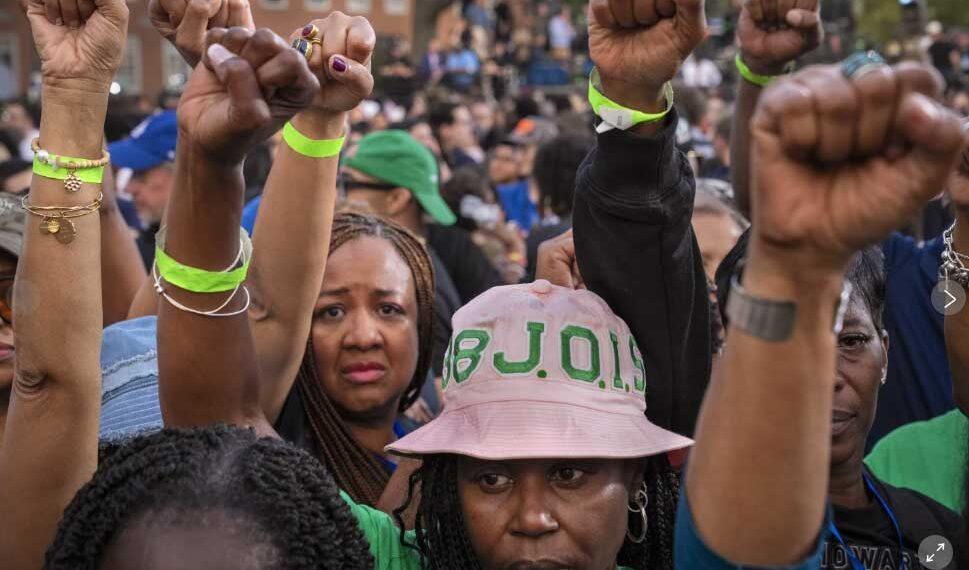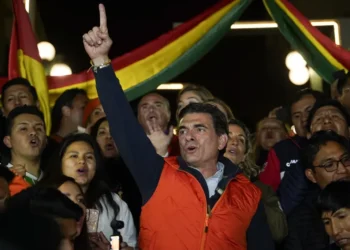Black Women Reflect on Support for Trump, Say They’re Taking a Step Back
ATLANTA (AP) — Teja Smith laughed to herself as she prepared for a vacation flight to Mexico. The idea of participating in another Women’s March on Washington felt distant.
As a Black woman, Smith couldn’t envision joining an effort similar to the massive protest against Donald Trump’s presidency in January 2017. This year’s election results, which saw Trump questioning his opponent’s race, holding rallies rife with racist rhetoric, and falsely accusing Black migrants in Ohio of eating residents’ pets, left her disillusioned. Despite it all, Trump didn’t just win re-election—he became the first Republican in two decades to clinch the popular vote, albeit narrowly.
“It feels like this is what America has chosen,” said Smith, founder of the advocacy-focused social media agency Get Social, based in Los Angeles. “At some point, you realize you can’t keep fighting without losing your sanity.”
After Trump was declared the winner over Democratic Vice President Kamala Harris, many politically active Black women felt a deep sense of disappointment. While they aren’t walking away from electoral politics or activism entirely, they are rethinking their levels of engagement and enthusiasm.
Black women have historically shouldered much of the responsibility for mobilizing voters in their communities. This year, they poured energy into supporting Harris, who aimed to become the first Black and South Asian woman president. Her loss hit hard, sparking a wave of reflections across social media. Many Black women expressed a renewed commitment to prioritizing their own well-being over devoting themselves to a nation that, time and again, seems indifferent to their concerns.
A survey by AP VoteCast of over 120,000 voters revealed that 6 in 10 Black women identified the future of U.S. democracy as the most important issue influencing their vote—more than any other demographic. But now, with Trump’s return to office imminent, some are shifting focus toward rest, mental health, and being selective about the causes they support.
“America is going to have to save herself,” said LaTosha Brown, co-founder of Black Voters Matter, a national voting rights organization.
Brown compared Black women’s roles in social justice movements to the North Star, which is known for its unwavering position in the night sky. While Black women have been key strategists and organizers for change, Brown said the next four years will see a shift.
“That’s not a burden we want to carry anymore. We’re not martyrs for a nation that doesn’t value us,” she said.
Shifting Priorities for Black Women
The AP VoteCast survey highlighted Black women’s concerns:
- Black female voters overwhelmingly prioritized democracy as their top issue, over other factors like inflation or abortion.
- More than 70% were “very concerned” that Trump’s presidency could lead to authoritarianism. In contrast, only about 20% expressed similar concerns about Harris.
In the 2024 election, about 90% of Black female voters supported Harris, mirroring the share who backed Joe Biden in 2020. Trump’s coalition, meanwhile, relied on support from more than half of white voters, who formed the bulk of his base in both elections.
For many Black women, the election outcome reinforced the sense that their efforts are undervalued. While their commitment to justice and democracy remains, there’s a growing call for balance—stepping back to prioritize self-care and mental well-being.
“Black women have always been the backbone of movements, but we can’t pour from an empty cup,” said Smith. “The fight is far from over, but it’s time to choose ourselves first.”
This article was rewritten by JournosNews.com based on verified reporting from trusted sources. The content has been independently reviewed, fact-checked, and edited for accuracy, neutrality, tone, and global readability in accordance with Google News and AdSense standards.
All opinions, quotes, or statements from contributors, experts, or sourced organizations do not necessarily reflect the views of JournosNews.com. JournosNews.com maintains full editorial independence from any external funders, sponsors, or organizations.
Stay informed with JournosNews.com — your trusted source for verified global reporting and in-depth analysis. Follow us on Google News, BlueSky, and X for real-time updates.













